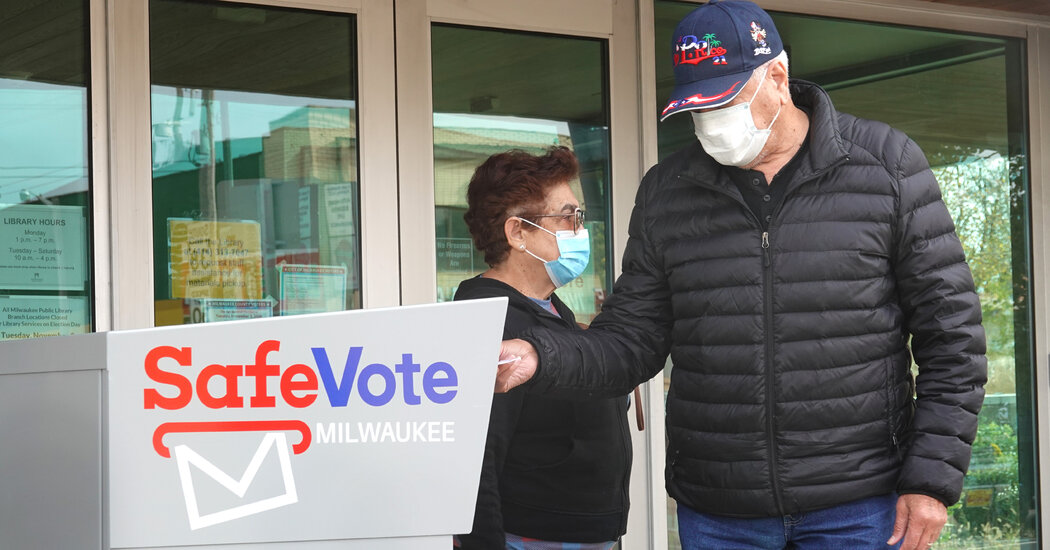Several disabled voters are suing Wisconsin’s Elections Commission in federal court after learning that they can no longer get help returning absentee
Several disabled voters are suing Wisconsin’s Elections Commission in federal court after learning that they can no longer get help returning absentee ballots, a reversal that they argue is unconstitutional.
The lawsuit, filed on Friday in United States District Court in Madison, seeks to restore a decades-old precedent that allowed people with disabilities to receive assistance from family members and caregivers with the return of absentee ballots.
The accommodation was struck down by the Wisconsin Supreme Court on July 8 in a 4-to-3 ruling by the court’s conservative majority, which concluded that only voters themselves could return their absentee ballots in person. The ruling did not address the handling of ballots that are returned by mail.
It also prohibited the use of most drop boxes for voting in Wisconsin.
The lawsuit filed on Friday concerns only the issue of who is authorized to return absentee ballots, something that Republicans have sought to clamp down on in Wisconsin and other states, falsely claiming that Democrats engaged in fraudulent ballot harvesting during the 2020 election.
Timothy Carey, 49, who has Duchenne muscular dystrophy and lives in Appleton, Wis., is one of four plaintiffs listed in the lawsuit. He said in an interview on Tuesday that he had voted absentee for 30 years, enlisting the help of a nurse or his parents to return his ballot. As someone who relies on a ventilator and cannot use his hands, he said a mandate that he return his own ballot presented a particular hardship.
Key Themes From the 2022 Midterm Elections So Far
The state of the midterms. We are now over halfway through this year’s midterm primary season, and some key ideas and questions have begun to emerge from the results. Here’s a look at what we’ve learned so far:
“I think that is shortsighted to not at least think about people with disabilities,” said Mr. Carey, who uses his mouth to control his power wheelchair. “They’re not thinking about us.”
Meagan Wolfe, the election commission’s administrator, was also named as a defendant in the lawsuit, which cited her recent response to a reporter’s question about whether caretakers could return absentee ballots on behalf of voters.
“As of right now, the voter is the one who is required to mail their ballot,” Ms. Wolfe said during a July 14 news conference. She prefaced her answer by saying that voters should check with local election officials about the options available for returning ballots.
A spokesman for the elections commission declined to comment further on Tuesday because of the lawsuit. But he drew attention to a clarification that Ms. Wolfe issued later on July 14, saying that her previous remark should not be viewed as a policy statement or statutory interpretation — and that municipal clerks were responsible for considering applicable laws for returning absentee ballots by mail.
The lawsuit has created a somewhat unusual juxtaposition for Josh Kaul, Wisconsin’s attorney general and a Democrat, who is representing the election commission but believes voters should be able to get help returning their ballots.
“Every eligible voter in Wisconsin should be able to cast a ballot,” Mr. Kaul said in a statement on Tuesday, adding that he had argued before the Wisconsin Supreme Court that “a voter can have another person put their absentee ballot in the mail.”
In the 36-page lawsuit, the plaintiffs argued that the rules change would disenfranchise disabled voters across Wisconsin in violation of the First and 14th Amendments, the Voting Rights Act, the Americans With Disabilities Act and the Rehabilitation Act.
“This is unlawful,” the lawsuit said. “Federal law guarantees that voters with disabilities enjoy full and equal access to state voting programs and thus that they are entitled to ballot-return assistance.”
www.nytimes.com
